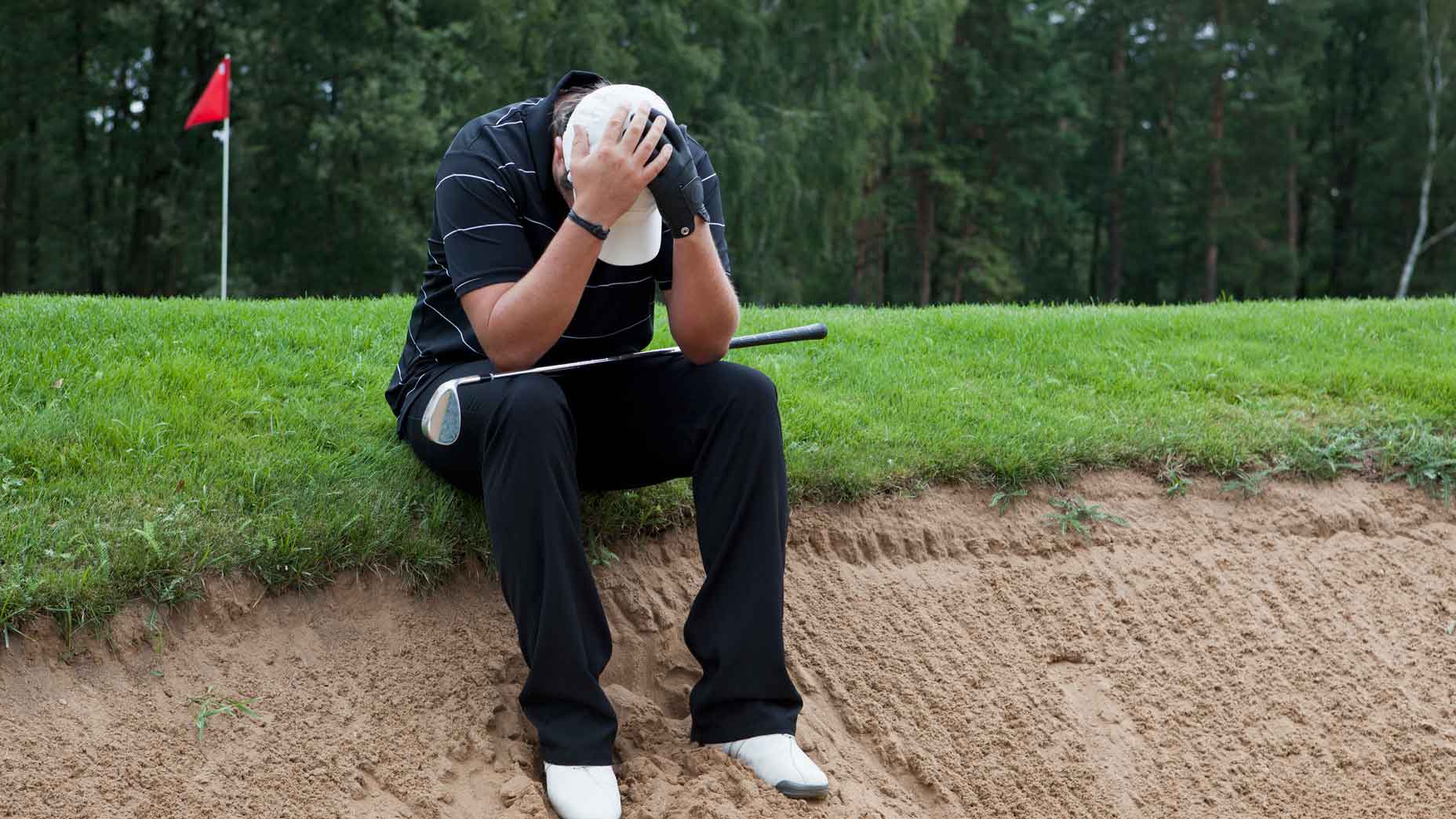
Frustration can pile up during a bad round. Here’s how to quell it.
Getty Images
I was playing in a charity pro-am recently when my game took a turn for the worst, but, luckily I had a few tricks up my sleeve to help me salvage my round. And now, I’m sharing my tips with you. Use these handy keys next time you find yourself struggling to recover during a bad round.
1. Practice resilience
It’s always noticeable when someone has given up on themselves during a round. It usually starts as a shift in demeanor, negative self-talk or poor posture. Over time these small changes can snowball into mistakes that lead to big numbers, and it can feel like your game is spiraling.
But you can regain some control by making an active effort to stay in your round. This can be something as simple as staying committed to your process, completing your entire pre-shot routine and avoiding unnecessary risks.
You might even try shifting your focus off the overall score entirely. See if you can two-putt the next hole, or hit the next fairway and green. This will help you stay present and in the moment.
2. Pay attention to your misses
Have you ever wondered why Tour pros watch their mishits so intently? It’s because they’re studying the ball flight so they can identify the cause of the off-center strike. When they know what caused the miss, they know what adjustments to make so they can get their game back to normal.
This is something you can do in your own game. I suggest working with a coach to understand what causes your most common misses. Figure out if it’s your setup, sequencing, clubface position, or something else. Then work with your instructor to develop a ‘band-aid’ or temporary fix for this miss. That way, the next time you’re playing and that pesky miss sneaks back into your game, you’ll know what you’re doing and how to fix it.
3. Select clubs you know you can hit
If things aren’t going well, one sure-fire way to turn things around is to hit the clubs you know you’ll strike solidly. This could mean forgoing your 3-wood for a more forgiving club like a 7-wood, or hitting a shorter club that’s designed to get the ball in the air. Selecting a club that’s easier to hit will give you some positive momentum and build up your confidence.
4. Set smaller goals
When I’m having issues on the course, I like to focus on a goal that’s easily attainable like hitting the center of the clubface. I find that small wins change the momentum of the round quickly, and encourage my students to utilize this tactic to get their game back on track.
5. Club up on your approach
Having contact issues? It’s always smart to take extra club on your approach into the green. This gives you a better shot of leaving these key shots close enough to make an up-and-down, two-putt or at worst make a bogey.
However, there are a few cases where leaving shots long might get you into more trouble, so, before picking your club, ask yourself three questions. Where is the pin? How much green do I have to work with? Are there any hazards around the green?
6. Focus on the controllables
It’s natural to get frustrated when your round isn’t going how you hoped, but instead of letting that anger take over, try to focus on the things you can control. This will help you avoid outbursts that bring you and your group down. Plus, it’s a constructive outlet for your frustration, so you’ll likely pull yourself out of your funk faster.
7. Groove a better feel with practice swings
Practice swings are a great tool to use on the course if you’re trying to groove a better feel. Sometimes I use them to rehearse specific moves in my swing, while other times I try to keep it simple and focus on brushing the grass cleanly. Regardless of their purpose, I always find that a few additional practice swings help me regain a bit of trust in my game.
8. Remind yourself, it’s just golf
When things are looking extra bleak, I find that it helps to remind myself that golf is a difficult game and no one gets out unscathed.
Even the best golfers in the world experience bad days on the course, so it’s likely your playing partners can relate to what you’re going through. Just remember that they’ve been there too and you should be able to keep your head up for the rest of the round.
9. Be supportive of your playing partners
If you want to catch a future invite with your playing partners, don’t forget to compliment their games. Oftentimes, I’ll see golfers get so consumed with their own games, especially when things go south, that they forget to participate with the group.
Your score won’t even matter once you leave the parking lot, so try to be supportive of your playing partners as they navigate the course alongside you.
10. What can you do to improve?
As is with any sport, golf is a game that’s earned and not given. One days when your game is really struggling, try to make a note of your mis-hits or areas of weakness in your game. Instead of viewing your round as a bad day on the course, shift your perspective. Consider it an opportunity to audit your game and formulate a more productive practice plan for the next time you hit the range.
Try these next time you’re struggling on the course. They might just be the thing you need to save your round.









